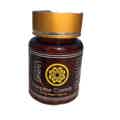reishi

Latin Name
Total Polysaccharides %
Beta Glucans %
Starch
Mycilium or Fruiting Bodies?
Substrate
Extract Ratio
Sustainably Grown
Amount per Serving
What are Reishi Mushrooms?
Reishi mushroom is a kind of fungus belonging to the family of Ganodermaceae of the Aphyllophorals that was used for about 2000 years in Traditional Chinese medicine. It is known by different names as Ganoderma Lucidum (G. Ludicum), Ling-zhi, mannentake or mushroom of immortality. It has a shining surface, a woody structure, and a rich red bloody color. Its name is derived from the Latin word lucidus, which meaning "bright." It may be found in nature mostly in living and dead woods under high humidity and unclear light environments of deciduous species. It grows naturally in the subtropical and temperate climate regions, as well as in the forests of Asia, Europe, and North and South America [1].
Historically, Reishi mushroom was used in China as a mind relaxing, replenish Qi, cough easing, asthma, palpitation, dizziness and insomnia [3]. In pharmacological properties, not just its nutrient benefits, which differ from other grown mushrooms, Reishi mushroom, classified as the plant of spiritual energy and also showed as a symbol of health, longevity, success and divine power in China [2]. Reishi's usage in nutrition, medical treatments, and cosmetics is rising on a regular basis, as evidenced by a huge increase in the number of clinical trials and experiments and as an active constituent in products from a wide range of supplements and cosmetics formulations.
Some important biologically active ingredients extracted from Reishi mushroom that are responsible for various pharmacological activities such as, carbohydrates, proteins, amino acids, triterpene, vitamins, minerals, steroids, nucleotides, and many ganoderic acids (A, B, C) and more [3].
We should mention that Reishi mushrooms are safe when used as a natural supplement according to the clinical studies that were carried out to evaluate the clinical efficacy and toxicity of Reishi. Also, it is rare for Reishi to produce any type of allergy or inflammation.
